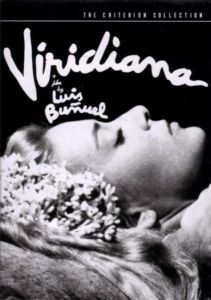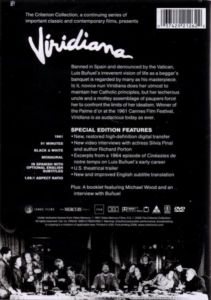#814
Seen It:
No
| Fernando Rey | Don Jaime |
| Francisco Rabal | Jorge |
| Margarita Lozano | Ramona |
| Silvia Pinal | Viridiana |
| Victoria Zinny | Lucia |
| Luis Buñuel | |
| Alicia Jorge Barriga | |
| José Calvo | Beggar |
| Lola Gaos | Beggar |
| Palmira Guerra | |
| José Manuel Martín | Beggar |
| Luis Heredia | Beggar |
| Joaquín Roa | Beggar |
| José Calvo (II) | |
| Jose Manuel Martin | Beggar |
| Joaquin Roa | Beggar |
| Director | Luis Buñuel; Luis Bunuel |
| Producer | Gustavo Alatriste; Ricardo Muñoz Suay |
| Writer | Luis Bunuel; Julio Alejandro; Luis Buñuel |
| Cinematography | José F. Aguayo |
| Musician | Ludwig van Beethoven; Georg Friedrich Händel; Wolfgang Amadeus Mozart; Gustavo Pittaluga |
Like any great film, Viridiana reveals its depth and detail through multiple viewings. The film is scathingly critical of Catholic hypocrisy and Franco's Spain (Don Jaime's estate is a direct reflection of the country's moribund state of sociopolitical decay), and its allegorical content was not lost on Spanish authorities, who banned the film (it wasn't shown in Spain until 1977) after it won the coveted Palme D'Or at the Cannes Film Festival. In a closing stroke of genius, Buñuel skirted around his censors with a final scene even more provocative (in its subtle implications) than the sexually suggestive ending he'd originally filmed. With much to say about the conflicting nature of human desires, Viridiana may have softened over decades, but it's never lost its ability to spark debate, discussion, and rewarding analysis of Buñuel's directorial vision. --Jeff Shannon
On the DVD
The newly restored, high-definition digital transfer of Viridiana impressively maintains Criterion's exacting standards of audio-visual quality; it's a flawless transfer, with deep blacks and richly detailed clarity. The supplements include new (2006) video interviews with actress Silvia Pinal and Spanish cultural scholar Richard Porton; warmly revealing excerpts from the 1964 French TV series "Cineastes of Our Times," featuring an interview with Buñuel; and a 30-page booklet with an essay on Viridiana by Princeton film scholar Michael Wood, and a generous interview excerpt from the book Objects of Desire: Conversations with Luis Buñuel. --Jeff Shannon
Features
|
|
||||||||||||||||||||||||||||||||

